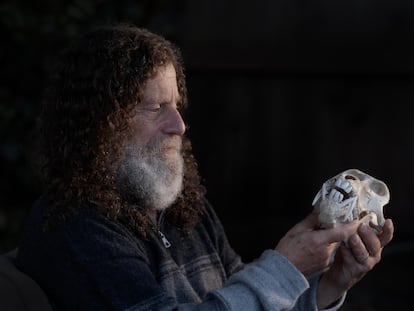
Kinkeeping, the exhausting invisible work that keeps the family together
Different studies have researched how this emotional, overlooked and eminently feminine job plays a crucial role in maintaining familial ties

Different studies have researched how this emotional, overlooked and eminently feminine job plays a crucial role in maintaining familial ties

Researchers point to the need to establish a program among vets that might flag up epidemics among humans

A study analyzes the movements that are driven by music compared to those that are driven by partner imitation. Interpersonal synchronization is a mechanism that is deeply present in humans

The specialist discusses the myths surrounding the male reproductive organ, the rise in circumcision and the negative impact of pornography

Some 44% of workers say they feel stressed, a record high figure that suggests burnout is not a psychological problem but rather a structural one

Researchers have used artificial intelligence to find out why some people have a better response to GLP-1 agonists

People with high incomes have 32% lower risk of mortality after a brain attack, according to a new study, which also looked at the impact of education and country of birth

A clinical trial shows the neuroprotective effect of lixisenatide, a GLP-1 receptor agonist. Its use during a year prevented patients from getting worse, in what has been described as limited but promising benefits

A study indicates that the onset of old age has been pushed back due to improvements in the quality and expectancy of life, while people’s perception of the elderly has also changed

Scientists study the neural process by which we believe we see human faces in inanimate objects and open the door to understanding diseases such as autism, schizophrenia, and Parkinson’s

Neuroscientists, biologists and philologists are investigating whether laughing virtually retains the ability to release endorphins, reduce stress and foster social bonds, its effects in person

Recent studies confirm dogs’ ability to understand us, their natural talent for empathizing with other species and the pleasure we get from sharing our lives with them

Three independent scientific studies analyze how the human brain transforms notes into feelings, a mystery that has intrigued psychologists and musicologists for decades

The lawsuit is set to affect the 8.5 million people who use the application’s messaging services. But the legal, moral and technological implications of the decision are far more reaching

The U.S. expert, who became an editorial phenomenon with her first book, explains the mysteries of female sexuality using science and humor, in addition to offering tips on keeping passion alive for long-term couples

In his latest book, ‘Determined,’ the researcher uses biology to make the case that free will does not exist, an idea that raises moral doubts about the concepts of guilt, punishment, merit and effort

A study analyzes how the birth rate collapse will reduce the world’s population. Experts warn governments to prepare for the challenges of living in an emptier world

Half of the people who take these weight loss drugs stop treatment within a year. Most regain two-thirds of their lost weight, but a new study suggests there is a way to avoid the rebound effect

In her book ‘Travelers to Unimaginable Lands,’ the expert reflects on the role of caregivers and analyzes how a healthy brain reacts to a sick one
Psychologists and patients condemn the image of depression painted by social media. Some creators have gone from raising awareness to trivializing psychological problems and encouraging self-diagnosis

According to experts, getting spooked recreationally can help you manage stress and anxiety. The consumption of this genre of cinema has skyrocketed after the pandemic

An analysis using pre-pandemic data suggests there’s a mental health crisis among young people’s mental health, but overlooks significant external factors

An experiment with prairie voles — small, fluffy rodents — explains how reuniting with an old partner generates a rush of dopamine that declines as time passes
The French ethologist, one of the fathers of the concept of resilience, delves into the healing power of grassroots sports

Thirty million dogs are slaughtered every year for food. Anthropologists believe that the consumption of this animal becomes normalized in times of famine and then, in some cultural contexts, its prohibition gets difficult

The genetic analysis of thousands of human remains from the Neolithic and Mesolithic explains how mutations that protected the first shepherds also predisposed them to suffer from autoimmune diseases
While the hair transplant market moves $9.5 billion a year, complementary treatments are boosting an emerging industry